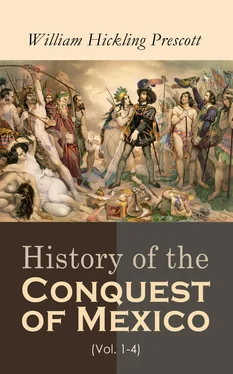Because he followed those contemporary writers so carefully, because with his vivid historical imagination he was able to transport himself into the remote past, to live with the conquering Spaniards the life of toil and privation that was sometimes almost beyond their iron endurance, to share with them their ever-present danger, to rejoice with them in their final victories, because so living, sharing, and rejoicing he was able to translate their dull stories into pages that sparkle with the fulness of life, men will still turn to those pages for the most graphic account of the exploits of Cortés and his associates,—for generations yet to come his work will continue to be read as one of the greatest masterpieces of descriptive literature.
W. H. M.
Table of Contents
AS the Conquest of Mexico has occupied the pens of Solís and of Robertson, two of the ablest historians of their respective nations, it might seem that little could remain at the present day to be gleaned by the historical inquirer. But Robertson’s narrative is necessarily brief, forming only part of a more extended work; and neither the British nor the Castilian author was provided with the important materials for relating this event which have been since assembled by the industry of Spanish scholars. The scholar who led the way in these researches was Don Juan Baptista Muñoz, the celebrated historiographer of the Indies, who, by a royal edict, was allowed free access to the national archives, and to all libraries, public, private, and monastic, in the kingdom and its colonies. The result of his long labors was a vast body of materials, of which unhappily he did not live to reap the benefit himself. His manuscripts were deposited, after his death, in the archives of the Royal Academy of History at Madrid; and that collection was subsequently augmented by the manuscripts of Don Vargas Ponçe, President of the Academy, obtained, like those of Muñoz, from different quarters, but especially from the archives of the Indies at Seville.
On my application to the Academy, in 1838, for permission to copy that part of this inestimable collection relating to Mexico and Peru, it was freely acceded to, and an eminent German scholar, one of their own number, was appointed to superintend the collation and transcription of the manuscripts; and this, it may be added, before I had any claim on the courtesy of that respectable body, as one of its associates. This conduct shows the advance of a liberal spirit in the Peninsula since the time of Dr. Robertson, who complains that he was denied admission to the most important public repositories. The favor with which my own application was regarded, however, must chiefly be attributed to the kind offices of the venerable President of the Academy, Don Martin Fernandez de Navarrete; a scholar whose personal character has secured to him the same high consideration at home which his literary labors have obtained abroad. To this eminent person I am under still further obligations, for the free use which he has allowed me to make of his own manuscripts,—the fruits of a life of accumulation, and the basis of those valuable publications with which he has at different times illustrated the Spanish colonial history.
From these three magnificent collections, the result of half a century’s careful researches, I have obtained a mass of unpublished documents, relating to the Conquest and Settlement of Mexico and of Peru, comprising altogether about eight thousand folio pages. They consist of instructions of the Court, military and private journals, correspondence of the great actors in the scenes, legal instruments, contemporary chronicles, and the like, drawn from all the principal places in the extensive colonial empire of Spain, as well as from the public archives in the Peninsula.
I have still further fortified the collection by gleaning such materials from Mexico itself as had been overlooked by my illustrious predecessors in these researches. For these I am indebted to the courtesy of Count Cortina, and, yet more, to that of Don Lúcas Alaman, Minister of Foreign Affairs in Mexico; but, above all, to my excellent friend, Don Angel Calderon de la Barca, late Minister Plenipotentiary to that country from the court of Madrid,—a gentleman whose high and estimable qualities, even more than his station, secured him the public confidence, and gained him free access to every place of interest and importance in Mexico.
I have also to acknowledge the very kind offices rendered to me by the Count Camaldoli at Naples; by the Duke of Serradifalco in Sicily, a nobleman whose science gives additional lustre to his rank; and by the Duke of Monteleone, the present representative of Cortés, who has courteously opened the archives of his family to my inspection. To these names must also be added that of Sir Thomas Phillips, Bart., whose precious collection of manuscripts probably surpasses in extent that of any private gentleman in Great Britain, if not in Europe; that of M. Ternaux-Compans, the proprietor of the valuable literary collection of Don Antonio Uguina, including the papers of Muñoz, the fruits of which he is giving to the world in his excellent translations; and, lastly, that of my friend and countryman, Arthur Middleton, Esq., late Chargé-d’Affaires from the United States at the court of Madrid, for the efficient aid he has afforded me in prosecuting my inquiries in that capital.
In addition to this stock of original documents obtained through these various sources, I have diligently provided myself with such printed works as have reference to the subject, including the magnificent publications, which have appeared both in France and England, on the Antiquities of Mexico, which, from their cost and colossal dimensions, would seem better suited to a public than to a private library.
Having thus stated the nature of my materials, and the sources whence they are derived, it remains for me to add a few observations on the general plan and composition of the work. Among the remarkable achievements of the Spaniards in the sixteenth century, there is no one more striking to the imagination than the conquest of Mexico. The subversion of a great empire by a handful of adventurers, taken with all its strange and picturesque accompaniments, has the air of romance rather than of sober history; and it is not easy to treat such a theme according to the severe rules prescribed by historical criticism. But, notwithstanding the seductions of the subject, I have conscientiously endeavored to distinguish fact from fiction, and to establish the narrative on as broad a basis as possible of contemporary evidence; and I have taken occasion to corroborate the text by ample citations from authorities, usually in the original, since few of them can be very accessible to the reader. In these extracts I have scrupulously conformed to the ancient orthography, however obsolete and even barbarous, rather than impair in any degree the integrity of the original document.
Although the subject of the work is, properly, only the Conquest of Mexico, I have prepared the way for it by such a view of the civilization of the ancient Mexicans as might acquaint the reader with the character of this extraordinary race, and enable him to understand the difficulties which the Spaniards had to encounter in their subjugation. This Introductory part of the work, with the essay in the Appendix which properly belongs to the Introduction, [3]although both together making only half a volume, has cost me as much labor, and nearly as much time, as the remainder of the history. If I shall have succeeded in giving the reader a just idea of the true nature and extent of the civilization to which the Mexicans had attained, it will not be labor lost.
The story of the Conquest terminates with the fall of the capital. Yet I have preferred to continue the narrative to the death of Cortés, relying on the interest which the development of his character in his military career may have excited in the reader. I am not insensible to the hazard I incur by such a course. The mind, previously occupied with one great idea, that of the subversion of the capital, may feel the prolongation of the story beyond that point superfluous, if not tedious, and may find it difficult, after the excitement caused by witnessing a great national catastrophe, to take an interest in the adventures of a private individual. Solís took the more politic course of concluding his narrative with the fall of Mexico, and thus leaves his readers with the full impression of that memorable event, undisturbed, on their minds. To prolong the narrative is to expose the historian to the error so much censured by the French critics in some of their most celebrated dramas, where the author by a premature dénouement has impaired the interest of his piece. It is the defect that necessarily attaches, though in a greater degree, to the history of Columbus, in which petty adventures among a group of islands make up the sequel of a life that opened with the magnificent discovery of a World,—a defect, in short, which it has required all the genius of Irving and the magical charm of his style perfectly to overcome.
Читать дальше












